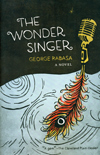The Wonder Singer
In George Rabasa’s The Wonder Singer, traditional genre tropes break from convention and expectation, creating a lovely cliché-bending crime novel with the pacing and plot of Elmore Leonard and the heart and scope of Russell Banks. Rabasa opens his novel with the death of the wonder singer, the operatic diva Merce Casals. His simple-seeming characters wear their occupations as their identity in life, all stuck and starving for an unbridled happiness: the opera singer, the writer, the nurse, the wife, the agent – all searching for something greater.
In George Rabasa’s The Wonder Singer, traditional genre tropes break from convention and expectation, creating a lovely cliché-bending crime novel with the pacing and plot of Elmore Leonard and the heart and scope of Russell Banks. Rabasa opens his novel with the death of the wonder singer, the operatic diva Merce Casals. His simple-seeming characters wear their occupations as their identity in life, all stuck and starving for an unbridled happiness: the opera singer, the writer, the nurse, the wife, the agent – all searching for something greater.
Mark Lockwood, “only modestly successful in his home-based business – Mark My Words, Inc., freelance writing of just about anything,” helms Casals’s autobiography as the ghost writer, but with her death has an opportunity to, for the first time in his career, write passionately for himself: “Long after he’d given up waiting for a novel to unfold, and money was rolling in for words on toothpaste, insurance and adolescent skin afflictions, Lockwood found himself caught up in someone else’s story.” As news leaks that Casals has passed away and her memoir suddenly becomes a high-price commodity, the agent, Hollywood Hank Holloway, and the new famous biographer, Alonzo Baylor, seek the taped conversations and journals of the wonder singer. Unfortunately, Lockwood has stolen the research and hit the road to finish her life’s story and, in turn, discover his own.
Stylistically, Rabasa juxtaposes a third person, present tense narrative against chapters from Lockwood’s version of Casals’ autobiography The Wonder Singer (the book within the book) written in first person, past tense. What makes this unique is that as Casals rise to stardom is told, so is Lockwood’s – both literally being his own stories. The first person narrative represents his personal story as his words explore another’s figurative story. The idea of perception permeates this complex structure by exploding clichéd wooden characters, twisting them into a tangled web of conflict.
As Lockwood writes in a chapter of Casals autobiography, “You don’t live with a man for fifty years without also falling a little in love with some of the objects that were an indispensable part of his personality.” Here, Rabasa comments on the classic life trap of complacency and passivity, citing that even a person’s belongings become who they are rather than simply being what they own. The end goal: character comes from persistence, not property. The Wonder Singer is a sweet story of stagnant situations made vibrant through love, art, passion, and the pursuit of absolute and unconditional happiness, at all cost.





